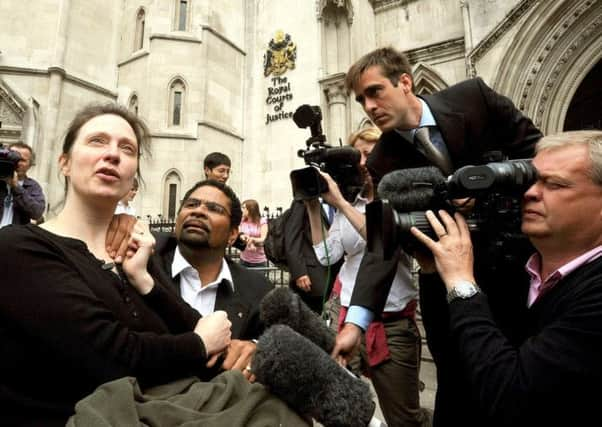Jayne Dowle: Let patients lose painful war with death in dignity


He had fought his way across Italy and Africa in the Second World War, dodging bullets and sniper fire to make a home to his wife and child.
This was his last battle. There was nothing glorious about it. When he eventually closed his eyes for the final time, everyone who loved him breathed a sigh of relief that his suffering was over. My views on assisted dying were already strongly in favour. This served to harden them into resolve.
Advertisement
Hide AdAdvertisement
Hide AdI am not squeamish about the process of death. My support for a change in the law on assisted dying is not borne out of any desire to protect my own feelings, or the death of Bradford right-to-die campaigner Debbie Purdy this week.
I watched my grandparents gradually decline and eventually pass away. And when it happened, I visited them in the chapel of rest and sat and talked with them a while before the time came for their funeral. It is fair to say that I am not afraid of the inevitability which must come to us all.
I have also had enough conversations with my friend, who nurses those in the last stages of terminal cancer, to not be sentimental about death. For those who are writhing in pain, unable to control even their most basic of bodily functions, there may be no purpose to life. Some individuals will choose to carry on, eking out every last breath. Some people though, wish to be able to make the decision to end it when they decide that enough is enough.
I understand the moral and religious arguments on all sides, respect those who will always believe that human life is sacrosanct above all. Yet, at the end of the day, I will always argue that this is a matter which should be up to the individual. In these situations, who is anyone else to stand judge and jury and declaim whether another person has the right to live or die? This is why the law needs straightening out, to enable and empower us all to make the decision should we need to.
Advertisement
Hide AdAdvertisement
Hide AdThis is why I support Lord Falconer’s private member’s bill, which would legalise the practice for the terminally-ill. The proposed legislation would allow doctors to prescribe a lethal dose to terminally-ill patients who are judged to have less than six months to live. It is currently on its way through the legislative process, but is yet to receive the full backing of the Prime Minister, who is “not convinced” by the arguments it holds.
It would be very wrong to underestimate the strides which have been made to propel the process to this stage. Only a decade ago, the business of deciding to end a life voluntarily was shrouded in a mixture of hysteria, suspicion and superstition. We don’t have much to thank television for these days, but I would argue that this controversial subject has been demystified by airing on TV.
There have been several strong documentaries, such as the one which took us inside the Dignitas clinic in Switzerland, where assisted dying is carried out. And it has even been the subject of a very effective (and affecting) storyline in a soap opera, when the character Hayley Cropper reached the end of her life in Coronation Street.
What was once whispered of only in medical circles, or hidden in the vaults of secretive family memories, is now up for open debate. This has led to widespread questioning of why those with the money and the means to travel abroad to end their life can do so, whilst those without either must endure.
Advertisement
Hide AdAdvertisement
Hide AdPut simply, the decision must be democratic and available to all who request it in a fair society. Indeed, I can’t put it any better than Lord Falconer himself, who opened his debate in the House of Lords with these words: “The current situation leaves the rich able to go to Switzerland, the majority reliant on amateur assistants, the compassionate treated like criminals and no safeguards in terms of undue pressure now.”
Although I will always argue from the point of view of the individual, I also can’t help but take into account the situation of the loved ones who must stand helplessly by. How many people must have watched their wife or husband, father or mother, in agony and pray that there had been a legal means to end their suffering? It is pure and simple human compassion to wish to ease another’s pain without being arrested for a criminal offence. Even the former Archbishop of Canterbury, Lord Carey, has changed his mind on the matter. He now believes that to refuse a plea for an assisted death is, “a denial of the living compassion that is the hallmark of Christianity”.
This is one law then where a change could literally mean the difference between life or death. For this reason if nothing else, that is why I support it.